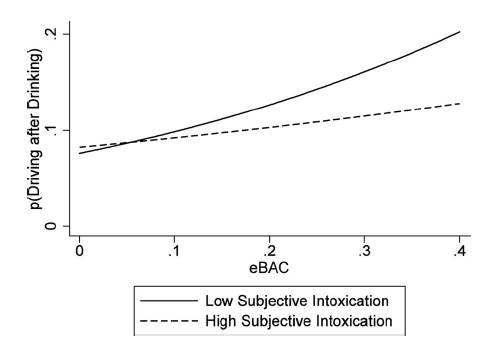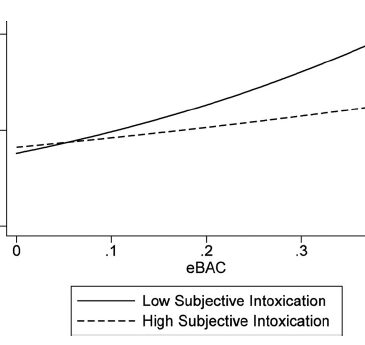The majority of research on predictors of DUI behavior focuses on individual-level factors, such as personality, sensation seeking, and comorbid psychiatric disorders (Nelson & Tao, 2012). This research, however, does not take into account event-specific factors that occur immediately before DUI behavior. This week’s DRAM reviews a study that investigates some of these situational factors. In this study, Quinn and Fromme (2012) examine how objective intoxication (i.e., BAC), and subjective intoxication affect the probability of DUI behavior among a sample of college students. In particular, researchers were interested in whether the disinhibiting effects of alcohol increased the probability of DUI behavior.
Methods
- The sample consisted of 1,350 first year college students who were already participating in a four-year longitudinal study on DUI behavior.
- Researchers included participants in the current analysis if they reported any drinking behavior and completed at least 14 diary entries per year.
- Participants kept an online diary everyday regarding their past-day alcohol consumption, subjective intoxication (i.e., how intoxicated they felt they were), and DUI behavior. Participants completed this diary for up to 30 days per year, for four consecutive years.
- Researchers estimated BAC using a formula including body weight, the number and type alcoholic drinks, and the duration of the drinking episode.
- Participants rated how drunk they thought they had become on a scale from 0 to 100, with 0 being not at all drunk, and 100 being extremely drunk.
- Researchers modeled the effects of BAC and subjective intoxication on DUI behavior using generalized estimating equations.
Results
- More than 25% of participants reported DUI behavior in their first year of college and more than 33% reported DUI behavior in their fourth year of college.
- Researchers found a significant main effect of estimated BAC on probability of DUI behavior, Odds Ratio (OR) = 1.02, 95% Confidence Interval (CI) [1.01-1.03]. As estimated BAC increased, so did the probability of DUI behavior.
- Researchers found a significant interaction effect between daily estimated BAC and subjective intoxication on probability of DUI behavior, OR = 0.996, 95% CI [0.99-0.998]. As estimated BAC increased, the probability of DUI behavior increased more rapidly for those reporting low subjective intoxication compared to those reporting high intoxication (see Figure).

Figure. Effect of estimated BAC and subjective intoxication on probability of DUI (Reproduced with permission from Quinn & Fromme, 2012). Click image to enlarge.
Limitations
- The study relies on retrospective self-report. Participants reported their drinking behavior the day after an episode. Additionally, diary entries could be completed up to a week after the drinking event. These reports might have been prone to memory or self-representation biases.
- The study uses an estimated BAC. This does not take into account many factors that affect BAC, such as meals consumed.
- Participants only rated their highest subjective intoxication. This does not necessarily represent their rated intoxication immediately before the DUI behavior.
- While the results were significant, the effect size is relatively small, meaning that the variables (i.e., BAC and subjective intoxication) and their interaction) only explain a small amount of the variation in DUI behavior.
Conclusions
This study represents an advance in our understanding the complicated decision making process behind DUI behavior. More generally, this study underscores the notion that not just individual-level factors, but also situational factors also contribute to DUI behavior. The probability of DUI behavior increased with estimated BAC. This effect was more pronounced for those who did not think they were intoxicated. Previous research suggests that alcohol impairs decision making processes, so that only the most salient or obvious cues are processed while intoxicated (Casbon, Curtin, Lang, & Patrick, 2003). For participants who feel drunk, this high subjective intoxication is a highly salient sign that tells them they should not be driving (Moss & Albery, 2009). However, for people who do not feel as drunk, this internal “warning system” might be silent and easily overridden by the impulse or desire to drive. The next step in this line of research is to further investigate factors that contribute to or reduce subjective intoxication among people with elevated BACs.
-Daniel Tao
What do you think? Please use the comment link below to provide feedback on this article.
References
Casbon, T.S., Curtin J.J., Lang, A.R., Patrick, C.J. (2003). Deleterious effects of alcohol intoxication: Diminshed cognitive control and its behavioral consequences. Journal of Abnormal Psychology, 112, 476-487.
Moss, A.C., Albery, I.P. (2009). A dual-process model of the alcohol-behavior link for social drinking. Psychological Bulletin, 135, 516-530.
Nelson, S. E., & Tao, D. (2012). Driving under the influence: Epidemiology, etiology, prevention, policy, and treatment. In H. J. Shaffer, D. A. LaPlante & S. E. Nelson (Eds.), The APA Addiction Syndrome Handbook (Vol. 2. Recovery, Prevention, and Other Issues, pp. 365-407). Washington, DC: American Psychological Association Press.
Quinn, P.D., Fromme, K. (2012). Event-level associations between objective and subjective alcohol intoxication and driving after drinking across the college years. Psychology of Addictive Behaviors, 26(3), 384-392. DOI: 10.1037/a0024275.





alibaba November 25, 2012
Hello there, You have done an incredible job. I will definitely digg it and personally suggest to my friends. I am sure they will benefit from this web site.